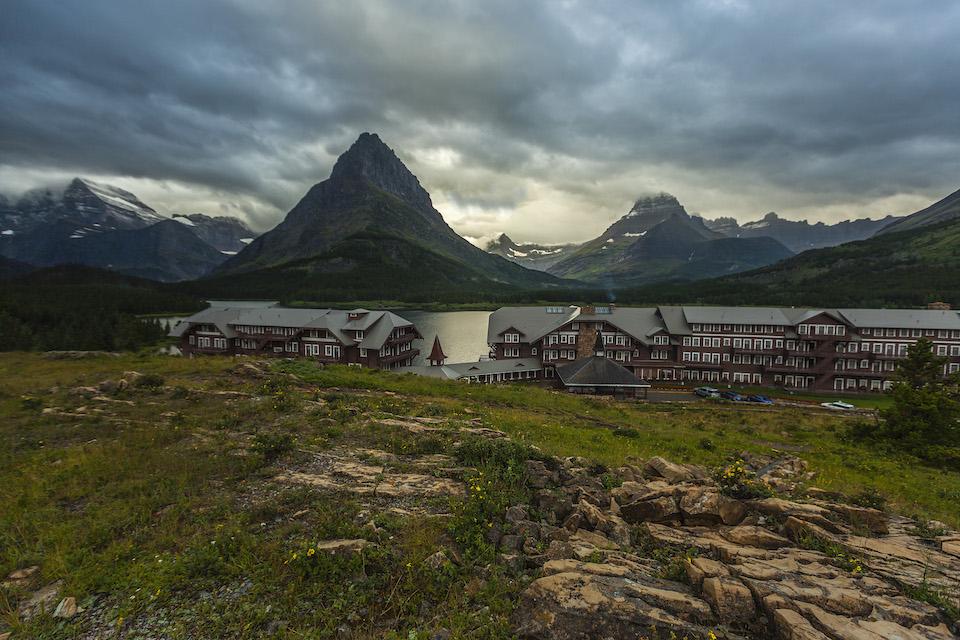
Storm clouds from the coronavirus pandemic are straining concessionaires who operate in the National Park System/Rebecca Latson file
Editor's note: This updates with Delaware North closing the Yavapai Lodge at Grand Canyon as of Sunday.
Concessionaires who run lodges, restaurants, inns, climbing expeditions, river trips, and other recreational operations in national parks have asked the White House to provide financial assistance to deal with the falloff in tourism to the National Park System due to the coronavirus pandemic. Their requests range from a waiver of franchise fees paid to the parks to a two-year extension of current contracts.
On Thursday, a major parks concessionaire, Xanterra Parks & Resorts, announced that it was closing all of its park lodges as of Friday through late May because of the virus.
"We want to assure you that your health and safety are a top priority, which is why we have made the difficult decision to close our national park lodges, hotels, and the Grand Canyon Railway until May 22," said Andrew Todd, company president, in a posting on Xanterra's website. "Additionally, we have halted cruises and tours to destinations that have been flagged as 'do not travel' by the US Department of State through April at this time, and have been working with top medical experts to stay as knowledgeable as possible. We are working with guests impacted by cancelled trips to provide alternative travel dates through 2021 and/or refunds. We have relaxed our cancellation policies in our tour and cruise businesses to give you confidence in booking future trips with us through 2021."
While Delaware North officials declined to comment on their plans, officials at Grand Canyon National Park said the concessionaire planned to close the Yavapai Lodge on the South Rim this Sunday until May 1.
Efforts to find out how the concessionaires' employees would be treated during the hiatus were not immediately successful.
Those announcements followed a letter from the National Park Hospitality Association to President Trump asking for financial aid to weather the coronavirus storm.
"National park concessioners are facing severe economic trauma from the coronavirus. Most of our operations are already shut down, and the likelihood of closure is high for many of the remaining operations, many of which are seasonal and being readied for opening," wrote Scott Socha, president of Delaware North's Parks & Resorts arm and NPHA board chairman, in the letter sent earlier this week.
"We believe the closures will cause a dramatic drop in visits and that visitor spending at our locations will decline by 75 percent or more this year," he added. "In fact, some of our operations will likely see a total loss of revenues."
The spreading pandemic has led to closures of such iconic lodges as The Ahwahnee Hotel in Yosemite National Park, Adventures on the Gorge at New River Gorge National River in West Virginia canceled bookings through mid-April, and Aramark canceled river trips and boat tours at Glen Canyon National Recreation Area in Utah.
Utah health officials earlier this week issued an order closing lodgings and campgrounds in the Moab area to non-local residents, and also shuttered restaurants, bars, and theaters in the area.
With concessionaires that operate in such parks as Glacier, Yellowstone, Death Valley, Sequoia, Kings Canyon, Olympic, Mount Rainier, Shenandoah and others relying heavily on seasonal workforces, including many employees from Europe, how the pandemic and related travel restrictions impact hiring for the busy summer months is up in the air.
"The impact on the park concessions industry reflects the general trauma facing the nation’s key travel industry but in fact we may be one of the most impacted facets of that industry," Socha wrote the president. "Concessioners include US-based leaders in the hospitality field as well as hundreds of small businesses, many of whom are multi-generational providers of visitor services to park visitors. We need help."
Help currently being sought by the concessionaires includes:
1) A waiver of franchise fees for operations in national parks for a period of one to two years, pending an assessment of the impact on our businesses through year end. Franchise fees range from 3 percent to 35 percent of our revenues but are a critical part of operational cash flows during this period. Forgiving franchise fees will allow us to retain staff enabling us to recover when the coronavirus pandemic ends;
2) An extension of all current contracts and contract terms for two years, to allow concessioners to recover at least a portion of the profits specified in the legislation establishing the National Park Service concessions program;
3) Allows use of entrance fees and other recreation fees collected by the agencies including the National Park Service, the Forest Service and the US Fish and Wildlife Service to rebuild visitation post-pandemic via information programs done in partnership with state agencies promoting visits to the shared legacy of our parks and wildlife refuges and forests and waters and encouraging purchase of the America the Beautiful Pass and park-specific annual passes. This would not change retention of 80% of collected fees by park units for uses at the unit’s discretion; and
4) Supplemental appropriations to the National Park Service to mitigate the loss of franchise fees.
John Freemuth, who holds the Cecil D. Andrus Endowed Chair for Environment and Public Lands at Boise State University, was curious how the National Park Service would feel about the concessionaires' requests.
"There might be concessionaires listed in No. 2 who aren't doing a good job and shouldn't get their contract extended," Freemuth also said Thursday.
The professor also hoped concessionaires would guarantee that they would retain staff if their requests were met, and added that the Park Service would be in trouble if request No. 4 was not granted.



Comments
My son, who is management at the Grand Canyon with Xanterra, told me that they are providing housing and meals for all employees even if they aren't "working."